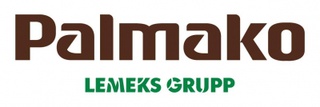PALMAKO AS current status
This company's branding has already reached 19,679 peopleand his is followed by 173 Storybook users.On average, the company has been rated 4.4 points.and commented 34 times.
Strategic decision: No desire to increase customer baseBoard member Rain Raudsepp (19.11.2025): "We focus only on providing high-quality service to existing customers and maintaining relationships. We do not plan to increase our customer base."
's activity report 2022
AS Palmako is a company belonging to the Lemeks Group, whose main activities are the production and sale of various prefabricated wooden buildings, glued laminated timber products, planed timber, heating pellets and electricity. 95% of the production is exported.
2022 was the 25th year of operation for AS Palmako. Garden timber - the production of various horticultural structures, children's playgrounds and houses, fences and garden decorations has been carried out for 22 years. In 2008, we started selling and producing elements of glued laminated timber structures - various beams and posts. At the end of 2012, wood pellets were added to our product range. In 2016, a merger took place with the sister company AS Imprest, as a result of which planed timber products were added to the product range and the garden timber range was expanded. In 2018, we started producing electricity at the Kavastu solar power plant. Production takes place in four production units - in Kavastu in Tartu County, Lääne -
Viru County in Laekvere, Põltsamaa and Lääne-Viru County in Ojaküla. The company has sales offices in the form of subsidiaries in France, England,
Finland, Sweden, Norway, Germany and North America.
The main target markets for Palmako are Germany, Sweden, France, and the United Kingdom. The consolidated sales turnover in 2022 was 86 million €.
In 2022, there were more negative influences in the external environment than positive ones. In the first weeks of the war in Ukraine, we decided on ethical grounds to immediately stop importing our main raw material - wood from Russia and the use of Russian-origin wood, creating a significant restriction and additional cost in sourcing the necessary raw material. As a result of the easing of COVID restrictions, consumer focus shifted from home garden construction back to regular entertainment and travel. Inflation driven by rising energy prices and a general decline in consumer confidence due to the war reduced demand in all product categories. The decline in garden timber sales volumes in the second half of the year was so drastic that we had to reduce production capacity from the usual two shifts to one, implement paid additional leave and reduce working hours.
Despite the difficult market situation, we were able to maintain glued laminated timber production on a 3-shift schedule. Inflation, especially the rise in energy prices, had a significant negative impact on the cost base. An additional restriction has been the additional domestic restrictions on the management of Estonian forests, which have affected our competitiveness and that of the Estonian timber industry more broadly. The result was positively influenced by the skyrocketing demand for wood pellets, which led to a very rapid price increase in the fall. However, the production volume of pellets was smaller than planned due to the shortage of raw materials.
The most significant investment was the expansion of the Ojaküla production unit, during which we built approximately 2000 m2 of production buildings, reconstructed the electricity, heating and aspiration systems, and installed the necessary technology with a focus on increasing the production of finished garden timber products.
Smaller investments in production automation were also made in other production units.
The turnover of the parent company decreased by 2% compared to the previous period, pre-tax profit increased by 126%. A total of 4.3 million euros was invested during the year.
Forecasting for 2023 is difficult - stocks of finished goods in the supply chain are still very large, demand is low due to various circumstances, the competitiveness of Estonian timber industry companies has declined due to the reorganization of wood import supply chains and additional national restrictions on the management of Estonian forests. The prospects for product categories are different, but across the group we predict a significant decline in production volumes and sales turnover, for which we have prepared in time and adjusted production capacity and cost base.
Settlements with partners outside the European Union are mainly in EUR or in their local currency, mainly British pound and Norwegian krone. The possible risk of exchange rate fluctuations arises from settlements in the local currencies of these countries, but the share of these countries is not so large in relation to total sales that possible exchange rate changes would have a significant impact on the company's business activities. The main currency in transactions with suppliers is the euro. Historically, exchange rate changes have not had a significant impact on the company's financial results. The interest rate on loans is linked
to EURIBOR, the possible change of which may have some impact on the company's interest payments.
Despite the difficult economic situation, we plan to continue investing in automation, digitization, better resource use, improving working and living conditions. The main focus is on product development, to create more added value for the goods sold and increase market share.
The most important financial ratios of the group are:
Indicator Calculation Method 2022 2021
Net sales profitability (ROS) % net profit/sales revenue 14% 5.1%
Return on equity (ROE) % net profit/average equity 30% 13%
Return on assets (ROA) % net profit/average assets 20% 8%
Asset turnover net sales/average assets 1.4 1.6




Comments (0)